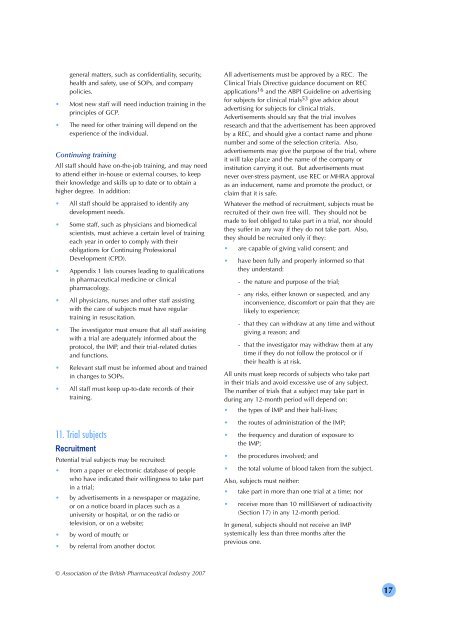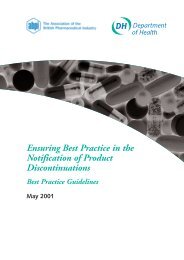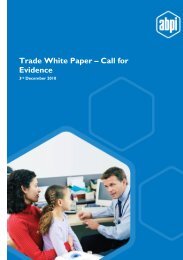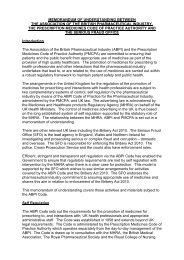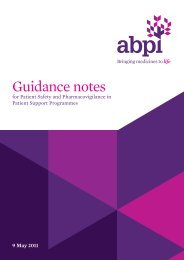ABPI Guidelines for Phase 1 Clinical Trials (PDF
ABPI Guidelines for Phase 1 Clinical Trials (PDF
ABPI Guidelines for Phase 1 Clinical Trials (PDF
Create successful ePaper yourself
Turn your PDF publications into a flip-book with our unique Google optimized e-Paper software.
general matters, such as confidentiality, security,<br />
health and safety, use of SOPs, and company<br />
policies.<br />
• Most new staff will need induction training in the<br />
principles of GCP.<br />
• The need <strong>for</strong> other training will depend on the<br />
experience of the individual.<br />
Continuing training<br />
All staff should have on-the-job training, and may need<br />
to attend either in-house or external courses, to keep<br />
their knowledge and skills up to date or to obtain a<br />
higher degree. In addition:<br />
• All staff should be appraised to identify any<br />
development needs.<br />
• Some staff, such as physicians and biomedical<br />
scientists, must achieve a certain level of training<br />
each year in order to comply with their<br />
obligations <strong>for</strong> Continuing Professional<br />
Development (CPD).<br />
• Appendix 1 lists courses leading to qualifications<br />
in pharmaceutical medicine or clinical<br />
pharmacology.<br />
• All physicians, nurses and other staff assisting<br />
with the care of subjects must have regular<br />
training in resuscitation.<br />
• The investigator must ensure that all staff assisting<br />
with a trial are adequately in<strong>for</strong>med about the<br />
protocol, the IMP, and their trial-related duties<br />
and functions.<br />
• Relevant staff must be in<strong>for</strong>med about and trained<br />
in changes to SOPs.<br />
• All staff must keep up-to-date records of their<br />
training.<br />
11. Trial subjects<br />
Recruitment<br />
Potential trial subjects may be recruited:<br />
• from a paper or electronic database of people<br />
who have indicated their willingness to take part<br />
in a trial;<br />
• by advertisements in a newspaper or magazine,<br />
or on a notice board in places such as a<br />
university or hospital, or on the radio or<br />
television, or on a website;<br />
• by word of mouth; or<br />
• by referral from another doctor.<br />
© Association of the British Pharmaceutical Industry 2007<br />
All advertisements must be approved by a REC. The<br />
<strong>Clinical</strong> <strong>Trials</strong> Directive guidance document on REC<br />
applications 16 and the <strong>ABPI</strong> Guideline on advertising<br />
<strong>for</strong> subjects <strong>for</strong> clinical trials 53 give advice about<br />
advertising <strong>for</strong> subjects <strong>for</strong> clinical trials.<br />
Advertisements should say that the trial involves<br />
research and that the advertisement has been approved<br />
by a REC, and should give a contact name and phone<br />
number and some of the selection criteria. Also,<br />
advertisements may give the purpose of the trial, where<br />
it will take place and the name of the company or<br />
institution carrying it out. But advertisements must<br />
never over-stress payment, use REC or MHRA approval<br />
as an inducement, name and promote the product, or<br />
claim that it is safe.<br />
Whatever the method of recruitment, subjects must be<br />
recruited of their own free will. They should not be<br />
made to feel obliged to take part in a trial, nor should<br />
they suffer in any way if they do not take part. Also,<br />
they should be recruited only if they:<br />
• are capable of giving valid consent; and<br />
• have been fully and properly in<strong>for</strong>med so that<br />
they understand:<br />
- the nature and purpose of the trial;<br />
- any risks, either known or suspected, and any<br />
inconvenience, discom<strong>for</strong>t or pain that they are<br />
likely to experience;<br />
- that they can withdraw at any time and without<br />
giving a reason; and<br />
- that the investigator may withdraw them at any<br />
time if they do not follow the protocol or if<br />
their health is at risk.<br />
All units must keep records of subjects who take part<br />
in their trials and avoid excessive use of any subject.<br />
The number of trials that a subject may take part in<br />
during any 12-month period will depend on:<br />
• the types of IMP and their half-lives;<br />
• the routes of administration of the IMP;<br />
• the frequency and duration of exposure to<br />
the IMP;<br />
• the procedures involved; and<br />
• the total volume of blood taken from the subject.<br />
Also, subjects must neither:<br />
• take part in more than one trial at a time; nor<br />
• receive more than 10 milliSievert of radioactivity<br />
(Section 17) in any 12-month period.<br />
In general, subjects should not receive an IMP<br />
systemically less than three months after the<br />
previous one.<br />
17


